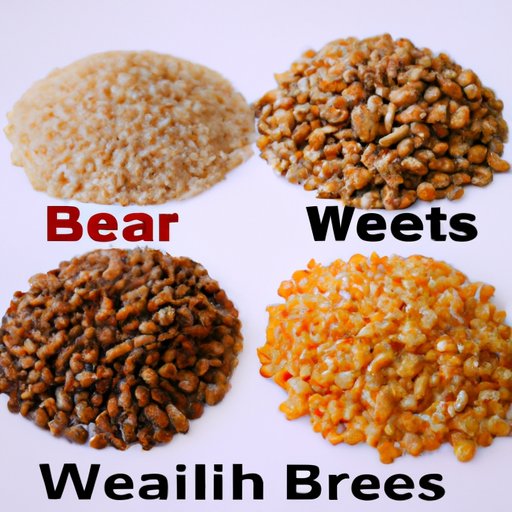Introduction
Whole grains are an important part of a healthy diet. They provide essential nutrients such as vitamins, minerals, fiber, and carbohydrates that can help you stay healthy and fit. In this article, we’ll explore why whole grains are good for you and provide recommendations for incorporating them into your diet.

Nutritional Benefits of Whole Grains
Whole grains are packed with essential vitamins and minerals. They contain B vitamins, which are important for energy production and metabolism, as well as minerals such as iron, magnesium, and zinc. Whole grains are also a great source of fiber, which is important for maintaining regularity and promoting gut health.
Whole grains are also a great source of complex carbohydrates. Complex carbs are digested more slowly than simple carbs, providing a steady supply of energy throughout the day. They can also help reduce the risk of type 2 diabetes and other metabolic diseases.

Whole Grains Support Healthy Digestion
Whole grains are an excellent source of dietary fiber, which helps break down food in the digestive system. Fiber helps keep things moving through the intestines and can help reduce constipation. It can also help promote the growth of beneficial bacteria in the gut, which can improve overall health.
A healthy digestive system is essential for optimal health. It helps break down food so that the body can absorb the nutrients it needs to function properly. Eating whole grains can help support a healthy digestive system and ensure that all the nutrients from the foods you eat are absorbed and used by the body.
Whole Grains and Weight Management
Whole grains can be a great addition to any weight loss plan. Because they are digested more slowly than processed grains, they can help keep you feeling full for longer. They are also low in calories and contain essential nutrients that can help support a healthy metabolism. Eating whole grains instead of refined grains can help you maintain a healthy weight and reduce your risk of obesity.
Whole grains can be a helpful part of a healthy balanced diet. They are rich in vitamins, minerals, fiber, and complex carbohydrates that can help keep you feeling full and energized. Incorporating whole grains into your meals can help you reach your weight loss goals and maintain a healthy weight.

Whole Grains and Heart Health
Whole grains can also help support heart health. Studies have shown that eating whole grains can help lower cholesterol levels and reduce the risk of heart disease. Whole grains are high in fiber and can help reduce bad cholesterol levels. They can also help regulate blood sugar levels, which can help reduce the risk of stroke and other cardiovascular diseases.
Eating a diet rich in whole grains can help reduce the risk of heart disease and stroke. They are a great source of essential vitamins, minerals, and fiber that can help keep your heart healthy and strong. Incorporating whole grains into your diet can help keep your cholesterol levels in check and reduce your risk of heart-related illnesses.
Whole Grains and Diabetes
Whole grains can also be beneficial for people with diabetes. Because they are digested more slowly than refined grains, they can help regulate blood sugar levels. Eating whole grains can help reduce the risk of type 2 diabetes and can also help manage existing diabetes. A balanced diet that includes whole grains is essential for managing diabetes and reducing the risk of complications.
Whole grains can be a helpful part of a diabetes management plan. They are packed with essential vitamins and minerals, as well as fiber and complex carbohydrates that can help regulate blood sugar levels. Incorporating whole grains into your diet can help you better manage your diabetes and reduce the risk of complications.
Whole Grains and Disease Prevention
Whole grains can also help reduce inflammation in the body. Inflammation has been linked to a number of diseases, including cancer, heart disease, and diabetes. Eating a diet rich in whole grains can help reduce inflammation and reduce the risk of these diseases. Whole grains are also associated with a reduced risk of certain types of cancer, such as colorectal and breast cancer.
Whole grains are a great way to reduce the risk of certain diseases. They are packed with essential vitamins, minerals, and fiber that can help reduce inflammation and reduce the risk of certain cancers. Incorporating whole grains into your diet can help you stay healthy and reduce your risk of many chronic diseases.
Conclusion
Whole grains are an important part of a healthy diet. They provide essential vitamins, minerals, fiber, and complex carbohydrates that can help you stay healthy and fit. Eating whole grains can help support digestion, aid in weight management, reduce cholesterol levels, regulate blood sugar levels, and reduce the risk of certain diseases. Incorporating whole grains into your meals can help you get the most out of your diet and stay healthy.
(Note: Is this article not meeting your expectations? Do you have knowledge or insights to share? Unlock new opportunities and expand your reach by joining our authors team. Click Registration to join us and share your expertise with our readers.)
